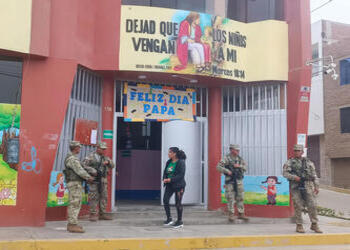Extortionists are targeting upscale private schools in Peru’s third-largest city, underscoring how exclusive educational institutions have emerged as sources of income for organized crime groups.
Twenty private schools in the northern city of Trujillo have been under protection from Peru’s army since June 11 following violent attacks that added to 150 reported cases of extortion in the city so far this year.
On June 8, police arrested four people in connection with the extortion of Montalcini European College. Among those arrested was a 16-year-old, accused of throwing dynamite at the school during school hours in late May, according to Peru21. Another suspect is just 11 years old. Both are alleged gang members of the local criminal group, the Pulpitos (the Little Octopuses), an offshoot of a larger group, the Pulpos (the Octopuses).
SEE ALSO: Financial Vulnerability Fuels Predatory Crime in Peru
Originating in Trujillo, the Pulpos are a criminal group known for extortion, kidnapping, and robbery across Peru. Its tentacles spread to parts of Chile, where they predominantly extort Peruvian migrants. The Pulpos use extortion as a means of territorial control and conduct other businesses such as the sale of land and contract killings.
Extortion has taken place despite a state of emergency implemented in Trujillo Province and neighboring Pataz in February 2024. The measure appears to have had little success. Peru’s national police have received over 900 complaints of extortion in the department of La Libertad, where Trujillo and Pataz are located, between January and July this year.
InSight Crime Analysis
Private schools receive a steady flow of income in the form of tuition payments, making them attractive targets for extortion in Latin America.
In Venezuela, groups have threatened students and their families for monthly sums of money, while in Ecuador, groups have attacked schools with grenades.
In Trujillo, extortion is entrenched, and the longstanding threat of violence in the city means few people or businesses can resist threats from gangs, Peruvian security analyst and consultant Pedro Yaranga Quispe, told InSight Crime.
SEE ALSO: Transport Extortion Worth $4 Mn a Year in Northwest Peru
“In the city of Trujillo, all businessmen pay quotas to extortionists,” said Quispe. “Even the illegal taxi drivers have to pay.”
While many people in Trujillo live in poverty, those who pay a monthly fee for their children to attend private schools do not. They are typically high-profile clientele such as politicians and businessmen. But their social standing does not make them exempt from falling victim to extortion. In fact, the income and social status of private schools make them stand out as ripe and lucrative targets for extortionists.
“The extortionists know that the businessmen who run private schools handle considerable capital. Therefore, they must pay just like the others,” Quispe said.
The armed forces do not have the specialties to uproot extortion, explained Quispe. In fact, there have been previous cases of corrupt soldiers cooperating in extortion schemes in Trujillo.
Feature image: Soldiers guarding private schools from extortionists in the Peruvian city of Trujillo. Source: MSN.

